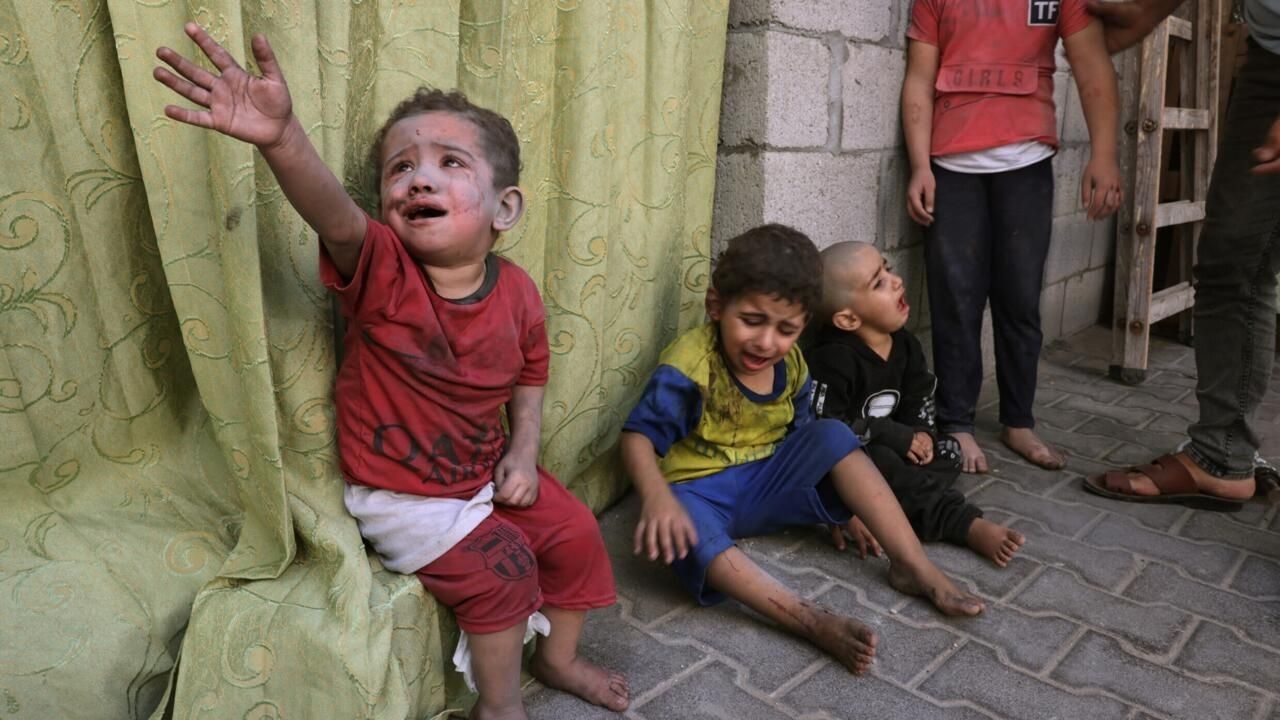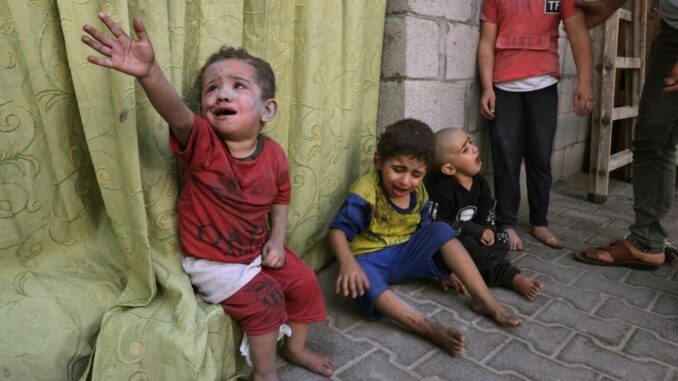

Children in Gaza.
The following article first appeared in the Electronic Intifada, March 6, 2023.
It’s 8 p.m. in Gaza, Palestine, right now, the end of my fourth day in Rafah and the first moment I’ve had to sit in a quiet place to reflect.
I’ve tried to take notes, photos, mental images, but this moment is too big for a notepad or my struggling memory. Nothing prepared me for what I would witness.


Children in Gaza.
Before I made it across the Rafah-Egypt border, I read every bit of news coming out of Gaza or about Gaza. I did not look away from any video or image posted from the ground, no matter how gruesome, shocking or traumatizing.
I kept in touch with friends who reported on their situations in the north, middle and south of Gaza — each area suffering in different ways. I stayed current on the latest statistics, the latest political, military and economic maneuverings of Israel, the U.S. and the rest of the world.
I thought I understood the situation on the ground. But I didn’t.
Nothing can truly prepare you for this dystopia. What reaches the rest of the world is a fraction of what I’ve seen so far, which is only a fraction of this horror’s totality.
Gaza is hell. It is an inferno teeming with innocents gasping for air.
But even the air here is scorched. Every breath scratches and sticks to the throat and lungs.
What was once vibrant, colorful, full of beauty, potential and hope against all odds is draped in gray-colored misery and grime.
Barely any trees
Journalists and politicians call it war. The informed and honest call it genocide.
What I see is a holocaust — the incomprehensible culmination of 75 years of Israeli impunity for persistent war crimes.
Rafah is the southernmost part of Gaza, where Israel crammed 1.4 million people into a space the size of London’s Heathrow Airport.
Water, food, electricity, fuel and supplies are scarce. Children are without school — their classrooms having been turned into makeshift shelters for tens of thousands of families.
Nearly every inch of previously empty space is now occupied by a flimsy tent sheltering a family.
There are barely any trees left, as people have been forced to cut them down for firewood.
I didn’t register the absence of greenery until I happened upon a red bougainvillea. Its flowers were dusty and alone in a deflowered world, but still alive.
The incongruity struck me, and I stopped the car to photograph it.
Now I look for greenery and flowers wherever I go — so far in the southern and middle areas (though the middle increasingly becomes more difficult to enter). But there are only small patches of grass here and there and an occasional tree waiting to be burned to bake bread for a family subsisting on U.N. rations of canned beans, canned meat and canned cheese.
A proud people with rich culinary traditions and habits of fresh foods have been reduced and accustomed to a handful of pastes and mush that have been sitting on shelves for so long that all you can taste is the metallic rancidity of the cans.
It’s worse in the north.
My friend Ahmad (not his real name) is one of a handful of people who have internet. It’s sporadic and weak, but we can still message each other.
He sent me a photo of himself that looked to me like a shadow of the young man I knew. He has lost over 25 kg (55 lbs).
People first resorted to eating horse and donkey feed, but that’s gone. Now they’re eating the donkeys and horses.
Some are eating stray cats and dogs, which are themselves starving and sometimes feeding on human remains that litter streets where Israeli snipers picked off people who dared to venture within the sight of their scopes. The old and weak have already died of hunger and thirst.
Flour is scarce and more valuable than gold.
I heard a story about a man in the north who managed to get his hands on a bag of flour recently (normally costing $8) and was offered jewelry, electronics and cash worth $2,500 for it. He refused.
Feeling small
People in Rafah feel privileged to have flour and rice reaching them. They will tell you this, and you will feel humbled, because they offer to share what little they have.
And you will feel ashamed, because you know you can leave Gaza and eat whatever you want. You will feel small here, because you are unable to make a real dent to assuage the catastrophic need and loss, and because you will understand that they are better than you are, as they have somehow remained generous and hospitable in a world that has been most ungenerous and inhospitable to them for so very long.
I brought as much as I could, paying for extra luggage and weight for six pieces of luggage and filling 12 more in Egypt. What I brought for myself fit into the backpack I carried.
I had the foresight to bring five big bags of coffee, which turned out to be the most popular gift for my friends here. Making and serving coffee to the staff where I’m staying is my favorite thing to do, for the sheer joy each sip seems to bring.
But that will soon run out too.
Hard to breathe
I hired a driver to deliver seven heavy suitcases of supplies to Nuseirat, which he ferried down a few flights of stairs. He told me that carrying those bags made him feel human again, because it was the first time in four months that he had been up and down stairs.
It reminded him of living in a home instead of the tent where he now resides.
It is hard to breathe here, literally and metaphorically. An immovable haze of dust, decay and desperation coat the air.
The destruction is so massive and persistent that the fine particles of pulverized life don’t have time to settle. The lack of petrol made people resort to filling their cars with stearate — used cooking oil that burns dirty.
It emits a peculiar foul smell and film that stick to the air, the hair, clothes, throat and lungs. It took me a while to figure out the source of that pervasive odor, but it’s easy to discern others.
The scarcity of running or clean water degrades the best of us. Everyone does their best with themselves and their children, but at some point, you stop caring.
At some point, the indignity of filth is inescapable. At some point, you just wait for death, even as you also wait for a ceasefire.
But people don’t know what they will do after a ceasefire.
They’ve seen pictures of their neighborhoods. When new images are posted from the northern region, people will gather to try to figure out which neighborhood it is, or whose house that mound of rubble used to be. Often those videos come from Israeli soldiers occupying or blowing up their homes.
Erasure
I’ve spoken to many survivors pulled from the rubble of their homes. They recount what happened to them with a deadpan countenance, as if it didn’t happen to them; as if it was someone else’s family buried alive; as if their own torn bodies belong to others.
Psychologists say it’s a defense mechanism, a kind of numbing of the mind for the sake of survival. The reckoning will come later — if they survive.
But how does one reckon with losing your entire family, watching and smelling their bodies disintegrate around you in the rubble, as you wait for rescue or death? How does one reckon with total erasure of your existence in the world — your home, family, friends, health, whole neighborhood and country?
No photos of your family, wedding, children, parents left; even the graves of your loved ones and ancestors bulldozed. All this while the most powerful forces and voices vilify and blame you for your wretched fate.
Genocide isn’t just mass murder. It is intentional erasure.
Of histories. Of memories, books and culture.
Erasure of potential in a land. Erasure of hope in and for a place.
Erasure is the impetus for destroying homes, schools, places of worship, hospitals, libraries, cultural centers, recreational centers and universities.
Genocide is intentional dismantling of another’s humanity. It is the reduction of a proud, educated, high-functioning ancient society into penniless objects of charity, forced to eat the unspeakable to survive; to live in filth and disease with nothing to hope for except an end to bombs and bullets raining on and through their bodies, their lives, their histories and futures.
No one can think or hope for what might come after a ceasefire. The ceiling of their hope at this hour is for the bombing to stop.
It is a minimal ask. A minimal recognition of Palestinian humanity.
Despite Israel cutting power and internet, Palestinians have managed to livestream a picture of their own genocide to a world that allows it to continue.
But history will not lie. It will record that Israel perpetrated a holocaust in the 21st century.
Susan Abulhawa is a writer and activist. This piece was written during her visit to Gaza in February and early March.
Download the PDF May Day appeal to the working class Revolutionary change is urgent! Gaza…
Philadelphia On March 26, the Pennsylvania Supreme Court denied political prisoner Mumia Abu-Jamal permission to…
There are two important and overlapping holidays on April 22: Earth Day and Vladimir Lenin’s…
Twelve people were arrested April 9 for blocking traffic to Travis Air Force Base, a…
Secretary-General of Hezbollah Sheikh Naim Qassem delivered a speech on April 18, 2025. Resistance News…
Anakbayan Philadelphia held a rally on April 19 to demand the U.S. end its military…